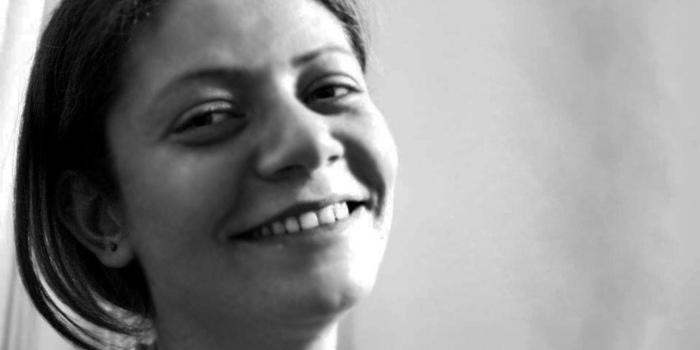Your dream was much larger than what could fit inside closed minds, as we shared, like many Syrians, the same dream. I know you were not scared because you were seeking that dream, and as your work filled the hours of your days, you did not find the time to feel fear.
Two years ago, in similar days to these, Razan Zaitouneh was threatened. I tried to persuade her to get out of Syria, but she refused, and told me she would not leave until her dream was realized. Razan dreamt of an end to the Assad regime, and the establishment of a democratic, civil and pluralistic state, a state fair towards all its citizens.
Throughout her life, Razan worked to defend prisoners of conscience, and although she didn’t agree with many of them intellectually and ideologically, she ceaselessly committed herself to their freedom. She was a free spirit, a deeply moral and sentimental one, a spirit that could not be tolerated by black minds, and was thus strangled for its diligence and elegance, as she shared with Syrians all their moments of pain, death and persecution.
In more than three years of my work with Razan in the Local Coordination Committees, she was never absent from the critical moments and events, and was among the first to move from place to place to monitor the pain and death suffered by many Syrians. She never slept enough, as she knew the enormous burden of her work, and that of everyone else’s who worked with her.
Wanting to live up to the momentous event that Syria was experiencing, Razan assumed great responsibility as one of the founders of the Local Coordination Committees, as a revolutionary leader, as an active human rights defender and as a prominent activist in relief, civil and media activities.
Razan held hope in her heart when only disappointment surrounded her, never letting go for a single day, as an inexhaustible source of optimism, work and dedication. As a source of this hope for many others during their despair, and I was one of them, Razan was always beside me to stand up again.
In spite of our differences on some points of view, we always agreed on the purpose and belonged to the same system of hard work that sought a free and democratic state, a state that would provide Syrians with dignity, freedom and justice for which they rebelled.
The kidnapping of Razan Zaitouneh, Samira al-Khalil, Nazem al-Hammadi and Wael Hamadeh cannot be reduced to any normal incident of abduction in areas of conflict, because it is a direct abduction of approach, thought and revolutionary values. It is a kidnapping of the concept of peaceful resistance, a denial of the real spirit of the Syrian revolution, the spirit of revolutionaries everywhere in Syria in the first year of the revolution, before the appearance of the ideology that bears no relationship with Syrian society, before the revolution turned to militarism.
The upcoming political negotiations dedicated to stop the bloodshed in Syria are supposed to discuss the country's future, but they may ignore the absence of abducted and detained activists; capable representatives of all Syrians, such as Razan Zaitouneh, Abdul Aziz al-Khair, Adnan Zaraii, Nabil Sharabajee and Yahya Sharabajee, and many others held behind the bars of detention centers or in the depths of the kidnappers' cellars.
In spite of my pessimism, I hope these names will be present in the agendas of Syrians attending these conferences and future negotiations. Those names should receive the opportunity they deserve to participate in building Syria again, as citizens first, and as pioneers of civil and national action second. They are the most capable of participating in the healing of Syrian wounds.
At the gates of the second anniversary of the abduction of these four activists, pain and hope still occupy our hearts, and we are still waiting.
This article was translated and edited by The Syrian Observer. Responsibility for the information and views set out in this article lies entirely with the author.


